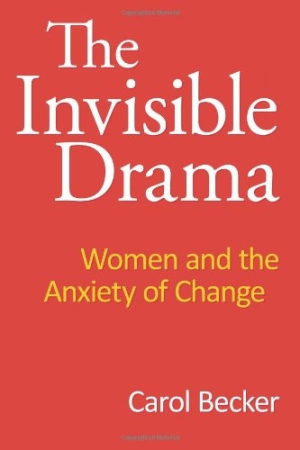The Invisible Drama
Women and the Anxiety of Change
The Invisible Drama shows women that when they control their anxiety, they can “become all they dare to imagine.”
Carol Becker’s The Invisible Drama is a richly insightful analysis of women’s collective psyche and the ways in which contradictions between how women think they should feel about their lives and how they truly do feel provoke anxiety. To demystify the psychological nature of anxiety and alleviate its inhibiting effects, the author shows how to embark on a journey of transformation toward psychological health unfettered by feelings of inadequacy. A practicable and instructive self-help guide that combines feminist theory, psychology, women’s literature, interviews, and psychotherapeutic case studies, The Invisible Drama shows women that when they control their anxiety, they can “become all they dare to imagine.”
The book’s title derives from The Diary of Anaïs Nin to describe the unnameable terror that strikes when every aspect of life seems both threatened and threatening. As Becker, dean of Columbia University School of the Arts, elucidates in methodical detail, the “invisible drama” of anxiety results from the change in traditional roles brought about by the women’s movement. As women have gone out into the world to attain economic, social, and emotional autonomy, they’ve also encountered unanticipated inner conflicts that unsettle inherited values deeply embedded in women’s collective unconsciousness. This feeling of being “trapped in a definition of femininity they could neither abandon nor accept” has generated much anxiety in women.
Becker structures her book in three parts to simulate the curative, three-stage hero’s journey illustrated in Homer’s The Odyssey and Dante’s The Divine Comedy. It is an effective technique that offers an organized and logical model to follow as they confront the source of their anxiety (Part I: The Problem), struggle with its opposing forces (Part II: Resistance to Change), and attain a healthy and developed sense of self (Part III: Stages in the Healing).
A psychology self-help book such as this is complex, and its ability to reach an audience depends upon accessibility and clarity. Becker delivers. Her source material is culled from literary and scholarly works and is impressive in its scope and structure. Whether it is a poem by Adrienne Rich, quotations from a psychology book by Dr. Natalie Shainess, or theories from feminist psychologists like Dorothy Dinnerstein and Karen Horney, Becker’s selection offers a balanced mix of the artistic and the theoretical. Also, a vast bibliography and notes section supplies readers with the resources needed to continue their journey to empowerment.
Writing in a measured pace with prose that is succinct and matter-of-fact, Becker deftly illuminates topics such as the beneficial female therapist/female client configuration for unburdening psychic hurts and the way in which self-love, not romantic love, “is the true antidote to anxiety.”
Traditionally published to international acclaim in 1987, this self-published edition was inspired by Becker’s observation of a global, “reactionary backlash” against women’s societal and emotional gains. Consequently, anxiety-producing forces still rage within and the struggle for autonomy persists, making The Invisible Drama as pertinent today as it was a generation ago.
Reviewed by
Amy O'Loughlin
Disclosure: This article is not an endorsement, but a review. The publisher of this book provided free copies of the book and paid a small fee to have their book reviewed by a professional reviewer. Foreword Reviews and Clarion Reviews make no guarantee that the publisher will receive a positive review. Foreword Magazine, Inc. is disclosing this in accordance with the Federal Trade Commission’s 16 CFR, Part 255.

